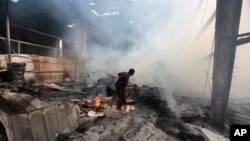Urban warfare is taking root in conflicts across the Middle East, with five times more civilians in Syria and Iraq killed in cities than in rural areas over the past three years, the International Committee of the Red Cross said Wednesday.
Tens of thousands of war-related fatalities among city dwellers accounted for 70 percent of civilian deaths in the two countries during the period, the agency said. The Yemeni cities of Taiz, Sadaa and Sana'a have also become deadly battlefields.
"This is all the more alarming as new offensives [against Islamic State militants] get under way in cities like Raqqa in Syria or intensify in Mosul, Iraq," said Robert Mardini, ICRC regional director for the Middle East.
"Taiz remains partly besieged just as daily airstrikes and shelling continue to terrify residents," he told a news conference to launch an ICRC report called "I Saw My City Die."
The phenomenon is not limited to the Middle East, Mardini said. "We see also that many other conflicts are taking place in urban areas in other places, such as Somalia and Afghanistan and other countries."
Battles raging in cities, which are "today the new normal unfortunately," damage vital infrastructure and disrupt basic services including health care, Mardini said.
"The impacts of warfare are quickly multiplied with exponential consequences. If a power line is hit, [there is] no water, no electricity, no waste water treatment. There are contamination outbreaks and massive challenges to run hospitals," he said.
Yemen's two-year civil war has been marked by a Saudi-led coalition carrying out massive airstrikes to restore President Abd-Rabbu Mansour Hadi to power and end rule by the Iran-backed Houthi militia.
Yemen's health system has all but collapsed, compounded by a deadly outbreak of cholera, a water-borne disease that can kill within hours, the ICRC said.
"In the last six weeks, 1 in 200 Yemenis have contracted cholera, while almost 1,000 have died. The outbreak has not seen its peak yet. It's just accelerating," Maria Del Pilar Bauza Moreno, ICRC health coordinator in Yemen, said by video from Sana'a.
More than 5,000 new cases of cholera were reported each day last week in Yemen, bringing the total to some 135,000. The ICRC has flown in four cargo planes with chlorine to treat water, as well as intravenous fluids to rehydrate patients.
"Cholera has found the perfect ground — deteriorated living conditions, poor hygiene behavior, unsafe drinking water in most of the cities, collapsed sewage systems, and uncollected garbage everywhere," Bauza Moreno said.





